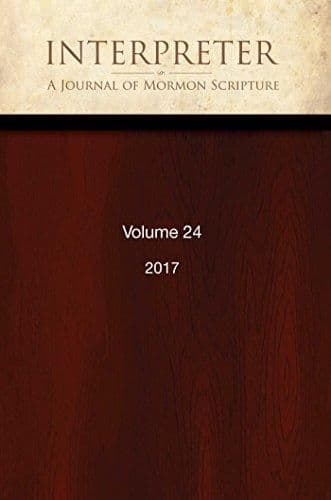Journal
Becoming Men and Women of Understanding: Wordplay on Benjamin— An Addendum

Title
Becoming Men and Women of Understanding: Wordplay on Benjamin— An Addendum
Publication Type
Journal Article
Year of Publication
2020
Authors
Bowen, Matthew L. (Primary)
Journal
Interpreter: A Journal of Latter-day Saint Faith and Scholarship
Pagination
239-280
Volume
36
Abstract
Royal and divine sonship/daughterhood (bānı̂m = “children”/“sons,” bānôt = “daughters”) is a prevalent theme throughout the Book of Mosiah. “Understanding” (Hebrew noun, bı̂nâ or tĕbûnâ; verb, bı̂n) is also a key theme in that book. The initial juxtaposition of “sons” and “understanding” with the name “Benjamin” (binyāmı̂n, “son of the right hand”) in Mosiah 1:2–7 suggests the narrator’s association of the underlying terms with the name Benjamin likely on the basis of homophony. King Benjamin repeatedly invokes “understand” in his speech (forms of “understand” were derived from the root *byn in Hebrew; Mosiah 2:9, 40; 4:4; cf. 3:15) — a speech that culminates in a rhetorical wordplay on his own name in terms of “sons”/“children,” “daughters,” and “right hand” (Mosiah 5:7, 9). “Understand,” moreover, recurs as a paronomasia on the name Benjamin at key points later in the Book of Mosiah (Mosiah 8:3, 20; 26:1–3), which bring together the themes of sonship and/or “understanding” (or lack of thereof) with King Benjamin’s name. Later statements in the Book of Mosiah about “becoming” the “children of God” or “becoming his sons and daughters” (Mosiah 18:22; 27:25) through divine rebirth allude to King Benjamin’s sermon and the wordplay on “Benjamin” there. Taken as a literary whole, the book of Mosiah constitutes a treatise on “becoming” — i.e., divine transformation through Christ’s atonement (cf. Mosiah 3:18–19). Mormon’s statement in Alma 17:2 about the sons of Mosiah having become “men of a sound understanding” thus serves as a fitting epilogue to a narrative arc begun as early as Mosiah 1:2.
Subject Keywords
Bibliographic Citation
Terms of use
Items in the BMC Archive are made publicly available for non-commercial, private use. Inclusion within the BMC Archive does not imply endorsement. Items do not represent the official views of The Church of Jesus Christ of Latter-day Saints or of Book of Mormon Central.